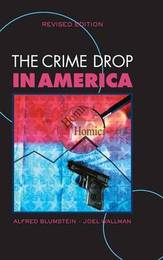
|
The Crime Drop in America
Hardback
Main Details
| Title |
The Crime Drop in America
|
| Authors and Contributors |
Edited by Alfred Blumstein
|
|
Edited by Joel Wallman
|
| Series | Cambridge Studies in Criminology |
|---|
| Physical Properties |
| Format:Hardback | | Pages:376 | | Dimensions(mm): Height 229,Width 152 |
|
| ISBN/Barcode |
9780521862790
|
| Classifications | Dewey:364.973 |
|---|
| Audience | | Professional & Vocational | | Tertiary Education (US: College) | |
|---|
| Edition |
2nd Revised edition
|
|
Publishing Details |
| Publisher |
Cambridge University Press
|
| Imprint |
Cambridge University Press
|
| Publication Date |
28 November 2005 |
| Publication Country |
United Kingdom
|
Description
Violent crime in America shot up sharply in the mid-1980s and continued to climb until 1991, after which something unprecedented occurred. The crime level declined to a level not seen since the 1960s. This revised edition of The Crime Drop in America focuses first on the dramatic drop in crime rates in America in the 1990s, and then, in a new epilogue, on the patterns since 2000. The separate chapters written by distinguished experts cover the many factors affecting crime rates: policing, incarceration, drug markets, gun control, economics, and demographics. Detailed analyses emphasize the mutual effects of changes in crack markets, a major focus of youth violence, and the drop in rates of violence following decline in demand for crack. The contrasts between the crime-drop period of the 1990s and the period since 2000 are explored in the new epilogue, which also reviews major new developments in thinking about the causes and control of crime.
Author Biography
Alfred Blumstein is a university professor and the J. Erik Jonsson Professor of Urban Systems and Operations Research and former Dean (from 1986 to 1993) at the H. John Heinz III School of Public Policy and Management of Carnegie Mellon University. He is also director of the National Consortium on Violence Research (NCOVR). Joel Wallman is Senior Program Officer at The Harry Frank Guggenheim Foundation in New York. He is the author of Aping Language (Cambridge University Press, 1992) He has also published in Computer Applications in the Biosciences, Current Anthropology, Criminology and Public Policy.
Reviews'The Crime Drop in America is a must-read for anybody concerned about crime in the United States, as it thoroughly and dispassionately assesses the possible causes of the striking reduction in crime during the 1990s. This volume stands alone in the literature. It addresses many of the topics found in criminology texts but is much more narrowly focused.' A. Didrick Castberg, Perspectives on Political Science 'As the first major book aimed at explaining the 1990s crime bust, this book is a must-read for all those interested in the characteristics and policy implications of crime.' Gary LaFree, The Journal of Criminal Law and Criminology 'The Crime Drop in America is an important collection of papers that systematically addresses various explanations for changing rates in violent crime in urban areas. This book is a 'must read' for criminologists. The questions examined are important, the research is carefully done, and the findings will not only help us sort out competing explanations for the current crime drop, but will also expand our general knowledge about crime causation and its control.' John H. Laub, American Journal of Sociology 'At last, a scholarly, disinterested examination of the rapid decline in violence during the 1990s, a phenomenon as puzzling as it was unprecedented. Many have claimed credit, from police executives to prison advocates, yet these essays show that many forces were at work. Targeted policing, a strong economy, new gun policies, higher imprisonment rates, stabilized drug markets - all played a role. Yet the book offers sober reminders that broad social forces, including changes in youth culture and marriage patterns, contribute to our crime condition. For all who care about a safe and just society, this book is a required primer.' Jeremy Travis, Senior Fellow, Urban Institute, former Director of the National Institute of Justice (1994-2000) and Deputy Commissioner for Legal Matters of the New York City Police Department (1990-94)
|